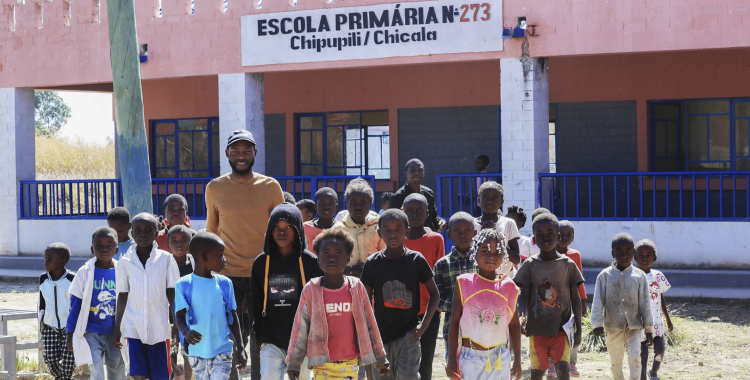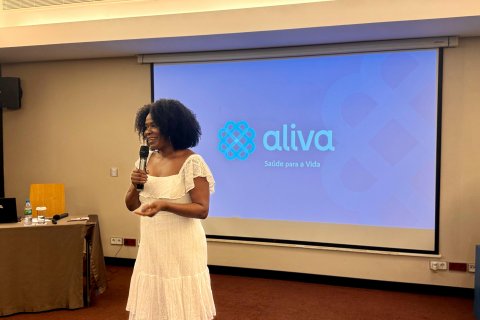Like them, thousands of students from rural areas walk dozens of kilometers to access education due to lack of transport.
Many give in to tiredness and the hardship of the journeys and drop out of school within the first few years. Others continue, but with low levels of learning and achievement.
"The education sector here has significant challenges", says José Edgar, communal administrator of Chicala, one of the communes in this province that occupies an area equivalent to 80 percent of the surface of mainland Portugal.
We are 52 kilometers from Cuíto, capital of Bié, a vast stretch of plateau where the population is mainly dedicated to family farming and where the poor condition of the road means spending almost two hours driving to get there.
In this commune, the 18 thousand inhabitants are distributed across 57 villages, all distant from each other, with no public transport, no water, no electricity, no cell phone network or Internet, and with a large number of young people of school age.
With the process of aggregation of schools, due to lack of classrooms and insufficient teachers, many children from the surrounding villages now have to travel to Chicala to go to classes, to the dissatisfaction of their parents, who often end up prefer to keep their children with them on the farm.
"Parents see their children sacrificing themselves, their achievement is low, they raised this concern with us", says the head of the commune, which has two school centers – one secondary and one primary – to serve a student population of 350 students.
The four teachers have 80 students per class at the beginning of the school year, but many are left behind.
Of the more than 1800 students enrolled in the 2023/2024 academic year, around 30 percent stopped going to class.
It's mid-morning and you can hear the childish tune of bê-a-bá recited by 2nd grade students from the window.
Teaching materials are scarce or non-existent and students, poorly fed, have little ability to concentrate. The person giving the Portuguese class is Frederico Chipessola, who patiently teaches the alphabet.
He asks one of the children to read on the board, but the little boy refuses.
"I'm hungry", he explains, sadly.
Children wake up early and many make the long walk with an empty stomach.
A sacrifice that also extends to teachers, such as Alberto Tiago, 30 years old, who teaches 3rd grade and commutes by motorbike daily from Cuíto to teach in Chicala.
"I leave at 4:30 am," he says, adding that he sometimes stays overnight at the teachers' house available in the commune.
His student Manuel Gueve, 12 years old, wakes up at almost the same time to get to school, on foot, from the village of Candondo.
His parents and brothers work in the fields and, despite the approximately 20 kilometers he travels, Manuel says he wants to continue coming to class "to learn", despite his tiredness.
We continued along the stormy road made of ruts opened by the rain, crossing paths with a few – "kaleluias", the three-wheeled motorbikes that serve as the main means of transport for this rural and poor population.
People walk here mainly on foot, men, children and women carrying their children on their backs and their bowls on their heads, African postcards where deprivations are hidden behind smiles.
The landscape, sometimes open, sometimes populated by small groups of adobe houses with thatched roofs or sheet metal roofs held together with stones, continues for another hour.
We traveled around 15 kilometers to reach school no. 122 in Chilema, which serves seven villages, the furthest of which – Dumba Kalunjololo – is 26 kilometers away.
Of the 68 Dumba students initially enrolled, 18 remain, says Leonardo Chicomo, the director of this school, who also spends six hours a day commuting from school to home, in Cuíto, on his motorbike.
The classroom is located in a shed and becomes a place of worship on Sundays. A solution that local authorities found to overcome the lack of classrooms.
Just over a dozen boys and girls huddle together on stools in this church that doubles as a school, listening distractedly to the mathematics class given by Miguel da Costa, 26 years old.
He arrived in the village less than a year ago, after four years spent in Chicala and earns around 150 thousand kwanzas a month.
"The biggest problem is getting around", which leads him to stay during the week in the village where teachers can spend the night, he laments.
With a hint of pride, he says that he learned to deal with other difficulties, isolation, life without the Internet and without a cell phone: "I'm a scout, we get used to it."
We advanced to the village of Kawewe, where many of the young people stopped going to school.
Jacinto Bunga, for example. He is 16 years old and stopped in 5th grade. Why? "The conditions," he responds.
It took him three hours to go to school and another three to get back and he ended up dedicating himself "to farming", joining his family.
During the rainy season, the road turns into a quagmire and becomes impassable, leading to school dropouts.
Ernesto Jamba has ten children and says that the youngest cannot go to school. "It's march time," he says.
Verónica Capolo has nine children and she too criticizes the distances that make the lives of these students even more difficult.
"If it were closer, they could study in the morning and go to the farm in the afternoon", helping their mother in growing the corn and beans that support the family.
Verónica speaks and, little by little, children and adults overcome their shyness and begin to point out their list of needs.
"We want schools, we want networks, we want crank (water), we want electricity, we want health", they ask.
We met Doroteia and Isabel again, in the afternoon, at Chicala school. The two young women from Cawewe are 16 years old and attend 6th and 7th grade. They left home around 10 am and will return at night.
The next day, everything happens again, it will be another 50 kilometers to access education, a right that is guaranteed, but that not everyone is able to exercise when they have to choose between eating or learning.
The scenario could soon change with the implementation of a pilot project within the scope of the "United for Education" initiative – which includes the Ufolo Center, the Ulwazi Foundation and the Ministry of Education – to train itinerant teachers and lead a "mobile school" to the villages.
The project is being planned with local authorities and aims to find logistical solutions to transport teachers, establishing partnerships with local motorcycle taxi drivers, and guaranteeing educational kits and audiovisual media, through, for example, portable solar panels, explains Rafael Marques, from Ufolo Center.
"Education has to meet students", says the activist and journalist, director of the Maka Angola website, who hopes to have the project on the ground at the beginning of the next academic year.







